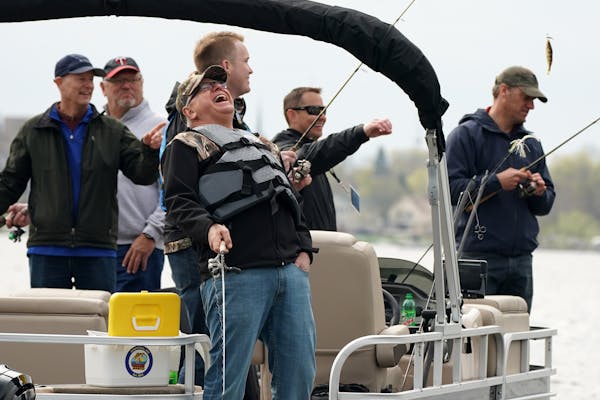American anglers in need of a Canada fix get a break beginning Friday when they can travel north of the border without being required to show a negative COVID-19 test result.
Canadian resort owners and outfitters who have barely hung on financially during the pandemic hope elimination of the testing requirement brings anglers and other tourists north this summer in droves.
But there's a hitch, the operators say, and it goes to the heart of the issue that has divided Americans since COVID vaccines were developed: Only about 65% of Americans have received first and second vaccine doses, and fewer still have received boosters.
And while Canada is dropping its requirement that visitors provide proof of a negative COVID molecular test within 72 hours of crossing the border, the same visitors must nevertheless be "fully vaccinated'' to gain entry.
Canada defines fully vaccinated as those who have had at least two vaccine doses.
"Unfortunately, not all Americans are vaccinated, and it seems that quite a few Americans who over the years have been coming to Canada to fish are in this category,'' said Erin Rody, marketing manager at Ontario's Sunset Country Association, a trade group that represents 170 resorts and outfitters.
The problem, Rody said, is that relatively few anglers travel to Canada by themselves. Many arrive in groups, some pieced together over long periods of time. Others are packaged as employee or customer reward trips. And some consist of multiple family members.
"So, the dropping of the testing requirement isn't a perfect solution to resort owners' problems,'' Rody said. "Maybe there's a group of five people who have been coming a long time. But one or two aren't vaccinated. Are the others going to come? Maybe, but maybe not.''
Canadian resorts that can be reached by vehicle have in some cases gained a modicum of income during the past two years by renting cabins to construction crews and other workers, Rody said.
But many of the far north's bread-and-butter outfits — those that can be reached only by boat or floatplane — have suffered with no income during that period except for deposits left by departing anglers in 2019.
In most cases those deposits have long since been spent.
Hoping for another lifeline, Canadian tourist operators are pleading with their government to drop visitors' vaccination requirements.
"Our tourism association is working hard on this issue,'' said Eric Brown Sr. of Totem Resorts, headquartered on Lake of the Woods.
Totem's 350 beds are spread among a handful of resorts and outposts. The business employs 200 people — or did, Brown said, before the pandemic, adding that Totem's successful operation depends in part on large corporate groups.
"If we have reservations for a group of 50 people and five or more say they're not coming because they're not vaccinated, is the trip going to be canceled, or will the smaller group come anyway?'' Brown said. "At this point, we don't know.''
Americans traveling to Canada beginning Friday must still upload proof of vaccinations and other information to ArriveCAN, the Canadian website that gathers pertinent traveler data prior to arrival at the border. (For complete Canadian travel details and requirements, tap here)
ArriveCAN likely will be in place long after the pandemic ends (assuming it ends), some Canadians say, because it smooths visitor entry at the border while also allowing the Canada Border Services Agency to schedule more or fewer agents depending on the volume of expected crossings.
High fuel prices are another concern for Canadian tourist operators, who fear that gas approaching $5 a gallon will deter at least some Americans from traveling north this summer.
For remote operators, deep snow this winter also has been a problem.
"We will be open this summer,'' said John Naimian, who with his family owns Oak Lake Lodge on Ontario's English River system. "But so far this winter, due to our extremely deep snow, we have been unable to get to our resort to haul fuel and other supplies in. Instead, we'll have to fly them in, which is more costly.''
Naimian said his resort's vaccinated groups are "definitely'' coming this summer.
"But there are others who are on the fence,'' he said. "In some cases, it's because some members of a party aren't vaccinated. Others think the vaccination requirement might be dropped for Canadian entry and they don't want to book for their entire group until it is.''
The hope, Naimian, Brown and other operators say, is that elimination of the testing requirement will incentivize Americans to travel north who otherwise might have stayed home.
Not only are molecular COVID tests costly, the operators say, in some cases their results aren't available for 48 hours. This discouraged some potential visitors from traveling to Canada from the Twin Cities and beyond — say, from Des Moines and Chicago — because they didn't want to head for the border only to learn en route they tested positive for COVID.
"To keep operating,'' Brown said, "we need all of our American clients up here. Not half of them.''

Anderson: With Bud Grant gone, his partner recalls good times afield while anticipating Minnesota's deer opener

Anderson: Price of Minnesota whitetail hunting can be dear, but needn't keep hunters on the couch

Anderson: How a mentoring program is helping underrepresented Minnesotans learn to hunt
![Sarah Strommen, first woman to be named commissioner of the DNR, in her office in St. Paul. ]
brian.peterson@startribune.com
St. Paul, MN Friday, Marc](https://arc.stimg.co/startribunemedia/R6UBV4HPQHBHJSEHQJDJVGFY7A.jpg?h=91&w=145&fit=crop&bg=999&crop=faces)

